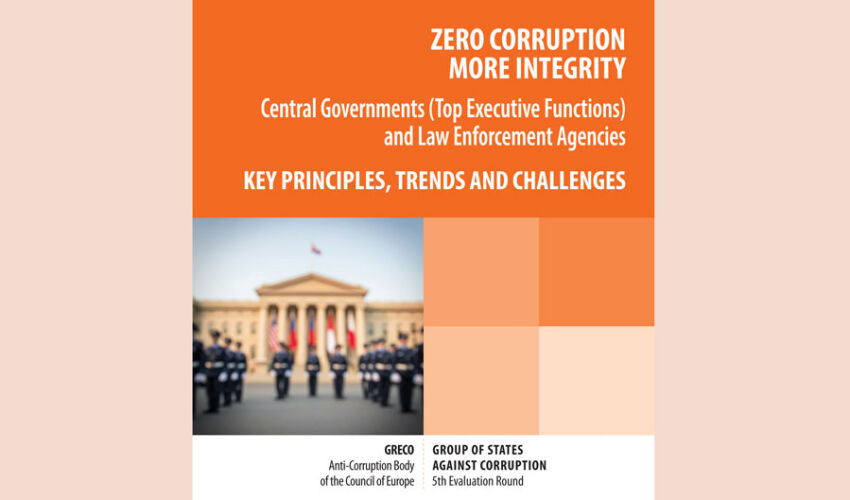
Such conclusions are contained in the annual report for 2024 of the Council of Europe’s Group of States against Corruption (GRECO), released on June 4. This structure includes all 46 Council of Europe member states, as well as the United States and Kazakhstan.
GRECO President David Meyer said:
“The global fight against corruption is at a critical juncture. Despite significant progress in strengthening the anti-corruption framework, persistent and evolving challenges remain, especially in the areas of enforcement, transparency and ongoing threats to judicial independence. Addressing these challenges requires renewed urgency and sustained political will at the national level.”
The Annual Report was published together with a study providing a comprehensive analysis of the progress made and gaps identified in the current phase of GRECO’s fifth round of evaluation, which focuses on promoting integrity and preventing corruption in the highest executive bodies of central governments and law enforcement agencies. Overall, the most significant progress has been made in the area of access to information and transparency.
However, it is noted that progress has been particularly slow in anti-corruption barriers for senior executive functions in Member States. This relates to integrity checks, post-employment restrictions, declaration verification mechanisms and contacts with lobbyists and third parties. The report emphasizes the need for clearer rules on perceived, potential and actual conflicts of interest, asset declarations and lobbying activities, as well as better implementation of integrity frameworks and enhanced oversight.
The most challenging areas for law enforcement agencies include asset, income, liability, and interest declarations; rotation and mobility policies; hiring requirements and appointment procedures; and integrity checks.
The GRECO study on the Republic of Moldova emphasizes that the country continues to face a number of challenges in the fight against corruption among top officials and law enforcement structures. An important area remains the implementation of effective mechanisms of control over asset declarations, the development of ethical standards among civil servants and the creation of conditions for transparent interaction with business and civil society. Despite the existence of a sufficient legislative framework, the country faces challenges in implementing these measures in practice. The need for systemic reforms is particularly relevant in the context of strengthening citizens’ trust in government institutions and ensuring conditions for fair business practices.
Regarding measures to increase transparency and prevent conflicts of interest, GRECO report emphasizes that Moldova has legislation regulating the declaration of assets of civil servants. However, the practice of its implementation raises questions – there is often no systematic verification of the reliability of the submitted data or their public disclosure. The authors also see the need to expand the circle of persons obliged to submit declarations and to introduce independent mechanisms for their verification.
In addition, the document notes the lack of uniform standards of behavior for top officials in the country, which creates risks of abuse. The need for regular trainings on ethics and anti-corruption activities is recognized as an important recommendation to improve the level of professional culture among officials.
The interaction with lobbyists was also assessed separately. GRECO considers that Moldova lacks clear rules on disclosure of contacts between civil servants and stakeholders, which creates prerequisites for corruption schemes. It is therefore recommended to develop appropriate regulations to increase the transparency of such interactions.
The study also draws attention to the fact that Moldova currently lacks a comprehensive anti-corruption strategy at the highest level of government, which reduces the effectiveness of measures to prevent abuse.
In addition, the country lacks strict rules regarding the transition of officials from the civil service to the private sector or vice versa, which creates risks of conflict of interest and the use of official position for personal gain.
In the field of police and other law enforcement agencies, there is a need to introduce codes of conduct, improve the level of professional ethics of employees, and create channels for confidential whistleblowing. There is progress in this direction, but the issues of systemic control over compliance with standards remain unresolved.
The overall conclusion of the study is that EU countries continue to improve their anti-corruption systems, emphasizing transparency in the activities of top officials and law enforcement structures.
For the Republic of Moldova, the GRECO assessment emphasizes the importance of continuous monitoring of the effectiveness of the measures taken and the need to adapt the legislation to the current challenges of corruption. This means continuing the course of strengthening institutional responsibility, improving the professional ethics of civil servants and creating conditions for a more open and accountable government.



